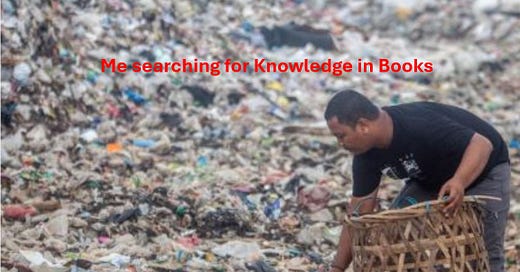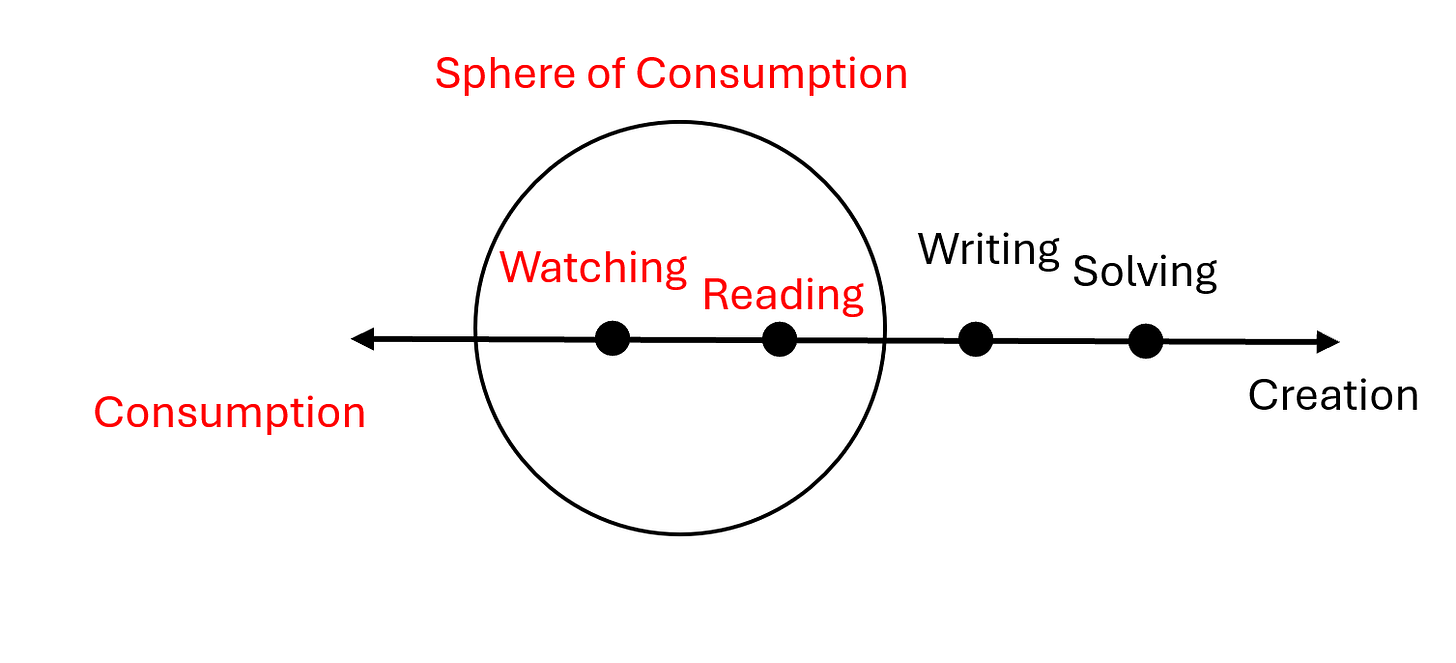Short summary:
In the first half, I discuss why reading often feels like consumption, and several fallacies of reading. Fallacies include the illusion of knowing, falling into Nth order thinking, sheer volume of books, how reading is majority intellectualization, and can we replace books from real life conversations?
In the second half, I focus on getting out of intellectualization by problem solving, how reading is different than watching, creation vs consumption spectrum, importance of consumption.
Much appreciate your thoughts in the comment section, and happy reading.
Part 1:
Let's get straight to the point. I think there is a general conception especially from what I see in Twitter and social media in general that reading books is a good idea. There is some reverence to the hobby of reading. It doesn't seem completely unreasonable, you can see where they're coming from. As someone who has been reading non-fiction books for past few years, who has made regular attempts to read, what I can say is that reading has its own Its own set of fallacies, which often go undiscussed.
Fallacy 1: Illusion of Knowing
Reading non-fiction books will give you this illusion that you know things. Say you start reading a book on psychology or self-help or history or any of that. After spending like a few months reading, it gives you a feeling like “I have read books”, ”I know things”.
You start using them during conversation. Feel smart about yourself, mostly unconsciously. I see my book-worm friends vomiting garbage from self-help books during conversations. They borrow ideas without ever mentioning the source, talk from the first person view than third person even when questioned. There seems to be no effort in separating own thoughts from sources you consumed from. At times it is interesting, but most of the time it feels like they are brainwashed by books and taking things out of context.
The single most disadvantage of reading non-fiction books is that it gives you this illusion that you are well read, know things, intellectually superiod. Even if you have known this possibility, and often recognize the inevitability of falling for illusions, it doesn’t give you any exemption.
This one disadvantage outweighs all the advantage, not falling into this illusion and overcoming it requires careful reflection.
What it is that the author was really trying to say?
In what context he was saying that?
How much of it can be applied to current context, if any?
If not careful, you start to develop new bias from the books, a new way of looking at things but taken out of context. This is the first fallacy.
Fallacy 2: Falling into Nth order thinking
Reading a book is rarely satisfying. Once the book is finish, I start looking at the references, find more books to get clarifications, ask again what the author was really trying to say. At the end there is only one way it ends. A feeling that authors ideas aren’t really clear. Meanwhile I can see my old beliefs being replaced by new ones.
Let’s take an example, You and your friend are having Pizza.
You ask “Hey why do you like Pizza?”
He says “I haven't eaten one in a while, blah blah”.
You don't stop there and ask again. “Okay, but why do you really like it?”
Because you are curious and get to the bottom of this.
He says, “in my childhood, I ate Pizza and I really liked it, blah blah”
You ask again why?
This time you don’t expect a friendly response. Again, ask this, one more time, which might frustrate your friend but you get the point I'm making here.
If you try to intellectually understand by questioning for the third or fourth time, “why this author is saying what he's saying”, especially when it comes to non-fiction books and their ideas, you are left in a limbo. There isn't any answer. There is a good answer if you ask the first or second time. “why did Sigmund Freud said sex is the core human motivation”? That is a sensible question when you ask for the first time, or second time.
I don’t deny the value of second order thinking. In fact I’m reinforcing the same that reading often needs to be followed by reflection. My point is about dangers of falling into Nth order thinking.
My feeling is that you often end up with another set of assumptions and beliefs, and start asking “is it really true?” or “why did they say this?” and “why not this?”. Finally you just have to ignore what others say. You just have to take with a pinch of salt. It's somewhat like a consumption of others ideas which are never clear to you, it doesn't mean there is no value, there is a value to some extent but when you want to really think about truth content, get to the bottom of things, it seems like bottomless.
Fallacy 3: Volume issue with non-fiction
For every single book I read, there are 100 more books that I won’t be reading. The sheer volume of books being published is overwhelming. It takes great deal of effort to search for the right books than reading them.
“if I read one more book, I would understand things better”
“If I could connect ideas in those 2 books, that might be more interesting”
There is a constant FOMO, a fear/anticipation that you might get a better understanding by reading that another book you never find.
Reading is like searching for scrap metal in the pile of trash :) One thing is guaranteed, exhaustion.
Fallacy 4: Reading is an intellectual entertainment:
If you want to take reading and apply it in real life, it is clear that intellectualism will not suffice. Intellectual understanding is only a part of the whole. There is intellectual understanding, then there is experiential understanding.
Intellectual understanding is bulging up but there is a minimal experiential understanding. This feeling of imbalance is what feels like consumption. Somebody has written some book because of some situation. There is a historical aspect of it for, there is a personal aspects of the author himself which isn't visible to the reader. There were multiple different contexts within which that book was produced. It is barely surprising that books are taken out of context.
Reality >> Lived Experience > Intellectualization
Fallacy 5: Replacing real-life conversations with Books
Books can an important doorway to other peoples worldview, however one has to be grounded to not get carried away by authors portrayal of people’s lives. Replacing traveling, meeting or conversing with people in real life can’t be replaced by act of reading alone.
my concern is neither rationality, nor science, nor freedom - abstractions such as these have done more harm than good - but the quality of the lives of individuals. This quality must be known by personal experience before any suggestions for change can be made. In other words: suggestions for change should come from friends, not from distant 'thinkers'. - Farewell to reason, Paul Feyerabend
For the reader, for the consumer, most ideas that you get from the book is abstractions. There is difference between abstraction and real life experience, right? It feels like it's building abstractions upon abstractions, which leaves you hanged when you ask “how does this help in real life?”
We often focus on what books are saying instead of how people are being felt. When intellectualism is valued more than experience, it seems to have crossed the boundary. In the context of Psychotherapy,
Getting our understanding of the transference or a projection correct in theoretical terms is perhaps less important than the manner in which we use our awareness of the transference to explore the client's experience. What matters is what the client experiences in the relationship with the therapist as the transference is explored: does the client feel that their subjective experience is understood before an explanation is given for it? - Transference And Projection: Mirrors to the Self
Part 2:
Getting out of intellectualization:
Personally after spending 2-3 years reading, the feeling of consumption with reading is evident and only growing.
How do you get out of this feeling that you are consuming books? You need to solve problems. Hallmark of understanding is problem solving. Otherwise, it is just intellectualization.
How can you say you are well read in history without making attempts to understand your own background in historical context of regional history?
How can you say you are well read in psychology literature if you can’t help bring psychological well being to your family, people around you?
It doesn’t make sense to disconnect ourselves from the reality in the name of history or psychology.
This is something that I'm still trying to understand, How do you get out of this feeling of consumption?
How reading a book is different from watching a movie?
Ask this to your book worm friend and observe their response.
Reading is often slow. It's often easy to miss things while watching or listening. Reading induces more mental stimulation, easier to reflect by comparing the previous page.
I believe watching Marvel movies, Arcane (League of Legends) series had more impact on me than any book. Building influential characters with visual story telling plus background music seems so effective. Both of these mediums of consumption comes with their own advantages.
However, If you zoom out a bit, reading is largely close to watching because both are consuming others ideas in different ways.
Importance of consumption:
Consumption isn’t all bad. Famous author SL Bhyrappa mentioned in an interview
I have referred to hundreds of history books before writing the novel. Out of my interest, I have studied history and my findings have resulted in a creative piece of work. - SL Bhyrappa
There is something creative about consumption. The taste matures with consumption. People admiring good music, cinema, food are examples. Refined consumption helps get better responses.
garbage in → garbage out
Refined input → Refined output
Concluding remark:
At the end, what probably matters is taking things lightly, ignoring, not overthinking. It is generally assumed that reading is what takes takes time. What I have realized is that, post processing, verifying the claims made in books take much longer. When it comes to philosophy, psychology it seems like many ideas from the books are simply out of reach due to lack of experiences. We need to be careful in worshiping this intellectual entertainment. As long as we don’t forget the fallacies, we are good to go.
Read less, Read slowly, Read what matters.







